Gaming routers used to be dismissed as a fad in the not-so-distant past, with plenty of users claiming these are simply better-dressed versions of standard routers. Times, however, have changed since; Most routers nowadays already deliver passable performance at multiple price points, making the niche a considerably more premium game, even as vendors add more features, better aesthetics, and software bundles meant to prioritize game latency and device performance while gaming.
With brands such as ASUS, TP-Link, Netgear, and more taking increased steps to ensure their devices are premium products catering to both console and PC gamers as well as content creators thanks to their unique feature sets, one can easily argue that if gaming routers were just a buzz earlier, they are now a sizable industry unto themselves as they come with cutting edge speeds and tech to maximize throughput and reduce latency to help gamers remove lag, routing-induced limitations, and network connection issues (NAT type issues anyone?) from the equation while promising a reliable experience.
Factors To Consider When Picking A Gaming Router In 2024
Users can make a more informed choice by keeping the following aspects in mind when shopping for a gaming router:
Gaming Features: While more advanced users might be dismissive about gaming-specific features, they are considerably more useful for most gamers who do not wish to get into the specifics but want better latency, more bandwidth, and better prioritization at the flick of a button. Most gaming-centric routers and some high-end options do offer these features, making them a considerably superior alternative to their non-gaming-centric offerings.
Price: Pricing is a key issue as routers often deliver diminishing returns at the highest end and gamers can often spend the money saved on a router on a PC upgrade. This means that picking a gaming router, much like any other PC part, is essentially a trade-off and one that needs to be considered carefully before purchasing a device that could very well outlast one's current PC.
Ethernet Ports: All mainstream routers have Gigabit Ethernet ports but some are created with better hardware than others, offering 2.5G or even 10G Ethernet ports for bandwidth-starved devices.
Software Support: While most users do not partake, some others often use 3rd party software on their routers such as DD-WRT which can only be found with regular support when one opts for more mainstream options. At the same time, users can also benefit from a variety of software and firmware updates that can fix security issues, support newer encryption standards, and fix existing bugs with newer hardware.
Wi-Fi Standard On Offer: Not all Wi-Fi routers are created equal and some newer versions may sport newer, faster standards like Wi-Fi 7 Wi-Fi 6E while others might offer Wi-Fi 6 or 5 support instead. Knowing what networking standards one's devices offer as well as knowing one's bandwidth needs can help users make an informed choice when it comes to picking a gaming router in 2024.
For the scope of the list below, however, one should note that the team at Game Rant considers devices below on features that qualify them as gaming routers as opposed to their branding alone, to make an informed decision on what is best, with a focus on functionality, bandwidth, future-proofing and dedicating gaming app support.
While Wi-Fi 7 is currently out and supported by some of the newest devices out there, most current hardware does not benefit from the significant price jumps in play. The team has added just one Wi-Fi 7 router option and will update the guide accordingly once prices normalize and more widespread hardware support is in play.
The Best Gaming Routers in 2024
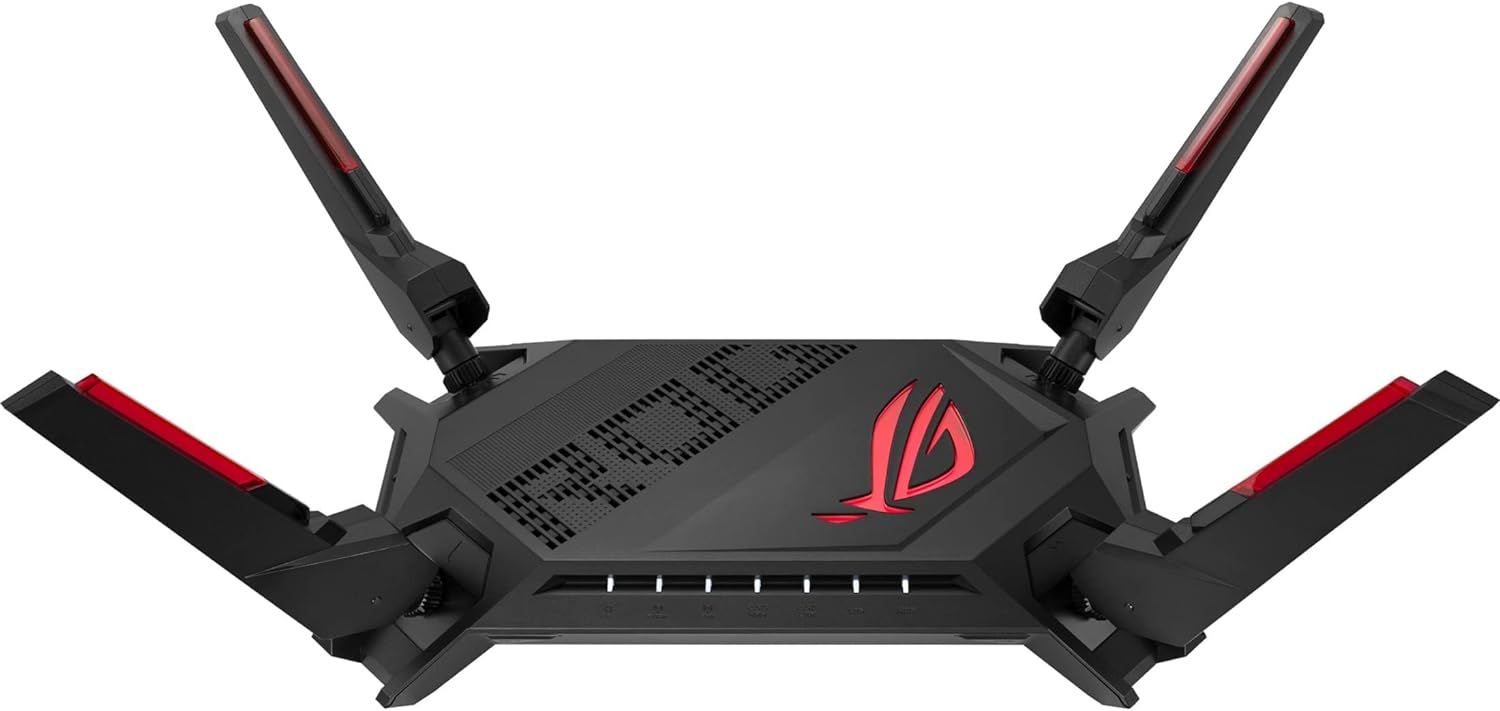
ASUS ROG Rapture GT-AX6000 Gaming Router
Balanced ROG Offering
- Brand
- ASUS ROG
- Ethernet Ports
- 2.5 Gigabit x 2, Gigbit x 4
- USB Ports
- USB 3.2 Gen 1 x 1, USB 2.0 x 1
- MU-MIMO
- Yes
- Mesh Network Compatible
- Yes, AIMesh
- Speeds
- Upto 5952 Mbps max, 4804 Mbps single band
- Security
- WPA3, WPA2, WPA
- Chipset/memory
- 2.0 GHz quad-core processor, 1GB RAM
- Wi-Fi Bands
- Dual Band 2.4 GHz / 5 GHz
- Supported standards
- IEEE 802.11a to IEEE 802.11ax
- Relatively well-priced compared to newer ROG-branded 'gaming routers'
- Has Dual 2.5G Gigabit Ethernet Ports
- Offers plenty of gaming-specific features and functionality
- Has dedicated networking security features
- Offers built-in VPN support out of the box
- Does not support Wi-Fi 6E unlike more modern alternatives
- Competing 'non-gaming' routers are often cheaper and faster and support newer standards
The ASUS ROG Rapture GT-AX6000 Gaming Router is an excellent, albeit expensive choice for power users looking for a gaming router. It offers a host of gaming-specific features such as its patented game boost technology, the ROG First packet acceleration tech, and dedicated gaming profiles to ensure that ports are open as required by some titles. In addition to this, bundled network security without a subscription and plenty of power and memory under the hood allow it to run a plethora of applications in tandem.
At the same time, the ASUS ROG Rapture GT-AX6000 Gaming Router can be extended easily using the built-in AI Mesh functionality as part of its offerings. With dual 2.5G ports, it can allow for high transfer speeds both on Ethernet from ISPs and to a primary gaming PC or console. It does seem somewhat limited in terms of speed primarily due to its lack of support for Wi-Fi 6E, with speeds capped to their maximum on the 5 GHz Wi-Fi 6 band instead. It is also considerably expensive versus what most non-ROG or non-gaming-centric routers offer for the same price points.
All in all, the ASUS ROG Rapture GT-AX6000 Gaming Router is a powerful router with a few caveats, but one that should suffice for an overwhelming majority of gamers, earning its place as the best overall gaming router available to gamers and enthusiasts alike. It also comes with a large price cut in tow across multiple retailers, making it a decent choice when considering its gaming-centric software offerings and mid-range performance potential on offer.
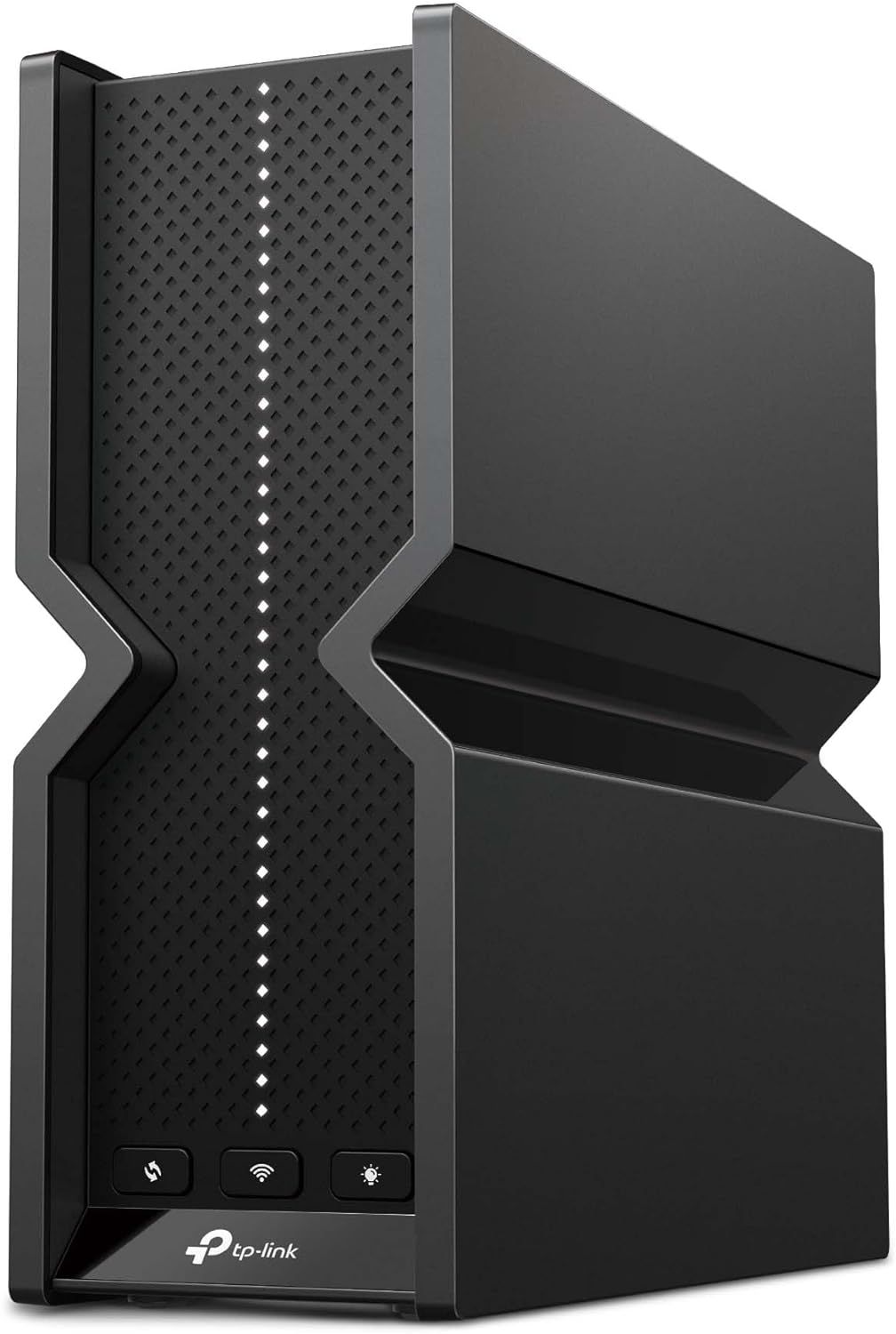
TP-Link Tri-Band BE9300 WiFi 7 Router
- Brand
- TP-Link
- Range
- unspecified
- Wi-Fi Bands
- Tri Band 2.4GHz, 5GHz, 6GHz
- Ethernet Ports
- 5 x Ethernet 2.5G
- USB Ports
- 1 x USB 3.0
- MU-MIMO
- Yes
- Mesh Network Compatible
- Yes, EasyMesh
- Supported standards
- Wi-Fi 7 and below
- Speeds
- Up to 9.2Gbps Tri-band, Up to 5.7Gbps Single band
- Security
- WPA/WPA2/WPA3, WPA/WPA2 Enterprise
- Chipset/memory
- Unspecified 'High Performance' CPU
- Supports the new Wi-Fi 7 standard
- Offers Ethernet 2.5G ports as a standard across the board
- Has a futuristic but compact look that feels akin to a business router
- Has extensive mesh network support as well as support for VPNs
- Requires hard-to-find, compatible Wi-Fi 7 hardware to benefit from its highest speed tier
- Lacks some gaming-centric features and integration that other gaming routers offer
The TP-Link Tri-Band BE9300 Wi-Fi 7 Router (also known as the Archer BE550 in some territories) takes center stage as one of the most popular Wi-Fi 7 routers thanks to a mix of excellent pricing, decent software, and internals that check multiple boxes. It can deliver up to 9.3Gbps of speed across its Tri-band offerings that are propagated by what TP-Link says are six optimally placed antennas, which should allow for multiple 4K and 8K streams while helping even the most demanding households in terms of bandwidth to max out their needs.
It uses 2.5G Ethernet ports as a standard, unlike some of its competition that still uses a mix of 2.5G and gigabit ports in a bid to cut costs. It also offers mesh support as well as powerful internet security tools, including VPNs, to ensure users and gamers alike can connect to regions and networks of their choosing in an easier, more streamlined manner.
While TP-Link does not offer any direct information on the CPU and memory configuration of the router, most user reviews tend to be positive, and only those looking to tweak their router with custom firmware benefit from such information. Regardless, it seems to be a curious omission on their part as a manufacturer.
The router does have its caveats, too. Wi-Fi 7 is hard to find on most current-generation devices, and one is essentially paying a premium for future-proofing their setup without any tangible benefits for most users currently. While the ports on the BE9300 cap out at 2.5gbps, only users requiring data across a Wi-Fi network itself would be able to benefit from the advertised 9.3gbps speeds, as wired internet connections would be limited to the active port on the device.
For users looking for a maxed-out Wi-Fi 7 router experience however, the next 10Gbps Ethernet port Wi-Fi 7 option that can be recommended comes from Netgear, in the form of the Nighthawk Triband RS700S router. That router offers up to 19Gbps speeds across all its bands, claims to cut down on latency, and offers better range as part of its bet on Broadcom’s powerful BCM6726/3 Wi-Fi 7 chips to deliver on the latest Wi-Fi standard's promise. However, it is more than double the price of the Archer BE550.
The TP-Link Tri-Band BE9300 Wi-Fi 7 Router has seen price cuts as Wi-Fi 7 continues to make inroads toward more mainstream product lineups and not only does it see a 10% price cut across the board, but retailers such as Amazon are offering coupons that bring the price even lower, making it a great, relatively future-proof router to pick up for gaming in 2024.
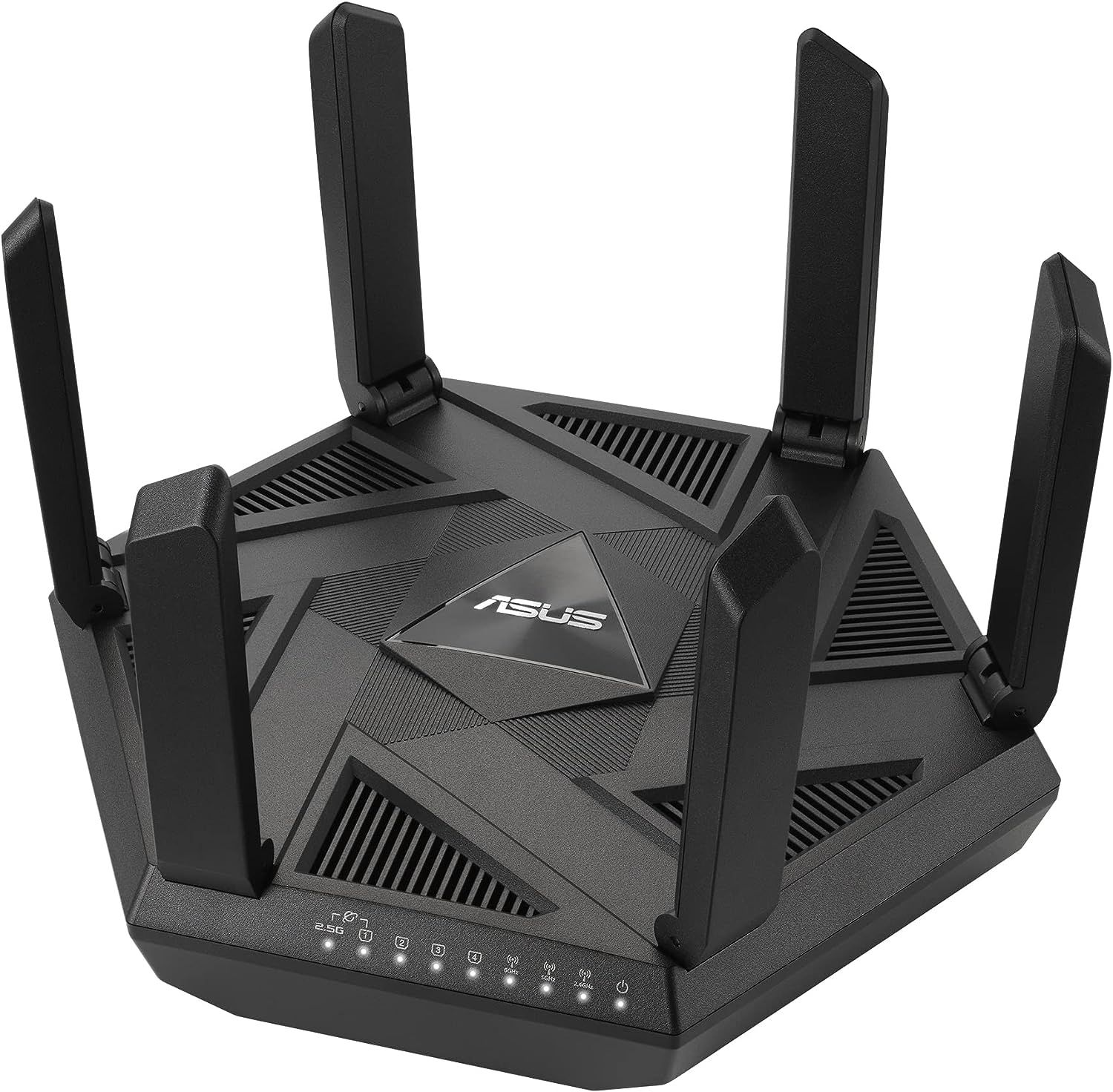
ASUS RT-AXE7800 Tri-band WiFi 6E Extendable Router
- Brand
- ASUS
- Ethernet Ports
- 2.5G x 1, 4 x Gigabit
- USB Ports
- USB 3.2 Gen 1 Port x 1
- MU-MIMO
- Yes
- Mesh Network Compatible
- Yes
- Speeds
- Up to 7800 Mbps combined 4804 Mbps Max Single Band
- Security
- WPA3, WPA2, WPA
- Chipset/memory
- 1.7GHz quad-core processor + 512G DDR4 RAM
- Wi-Fi Bands
- Tri-band Wi-Fi: 2.4 GHz / 5 GHz / 6 GHz
- Supported standards
- 802.11b, 802.11ax, 802.11a, 802.11ac, 802.11g
- Others
- Supports Alexa
- Has Dual 2.5G Gigabit Ethernet Ports
- Offers Wi-Fi 6E Support out of the box
- Offers built-in VPN support out of the box
- Has dedicated networking security features
- Supports Amazon Alexa controls
- Has excellent mesh routing support
- Somewhat bulkier thanks to its more unique shape and un-detachable antennas
- Has no dedicated gaming features in play.
The ASUS RT-AXE7800 Tri-band Wi-Fi 6E Extendable Router offers a no-nonsense performer with Wi-Fi 6E support in addition to a combined tri-band speed throughput of 7800 Mbps wirelessly. With Dual 2.5G Ethernet ports and support for mesh routing via ASUS's AIMesh tech, it comes equipped with excellent tools to support a small or a large gaming setup, even as it supports voice control via Alexa-based devices.
Its six antennas are not detachable however, and the limited number of Ethernet ports might be an issue for some power users, but for what it costs, the RT-AXE7800 offers plenty of power under the hood with support for easy access via applications, as well as support for 2 major VPN tunnel protocols: Wireguard and OpenVPN. While some gamers might find its features not directly complementing games or boosting them, more advanced users or those who like to tweak their routers would find this a very capable, and comparatively inexpensive option to more costly ROG Rapture routers from the same company.
it does currently trade at a sub-20% discount over MSRP at Amazon and on Best Buy for its Plus Members, making it an even better deal than most of its competition when one considers routers that offer stellar connectivity even if gaming-centric features are relatively absent. Users who want a more gaming-centric router can opt for the ASUS GT-AX6000 above instead, but for users needing a high-end router option that can handle their VPN needs exclusively for gaming, the AXE7800 is a better fit.
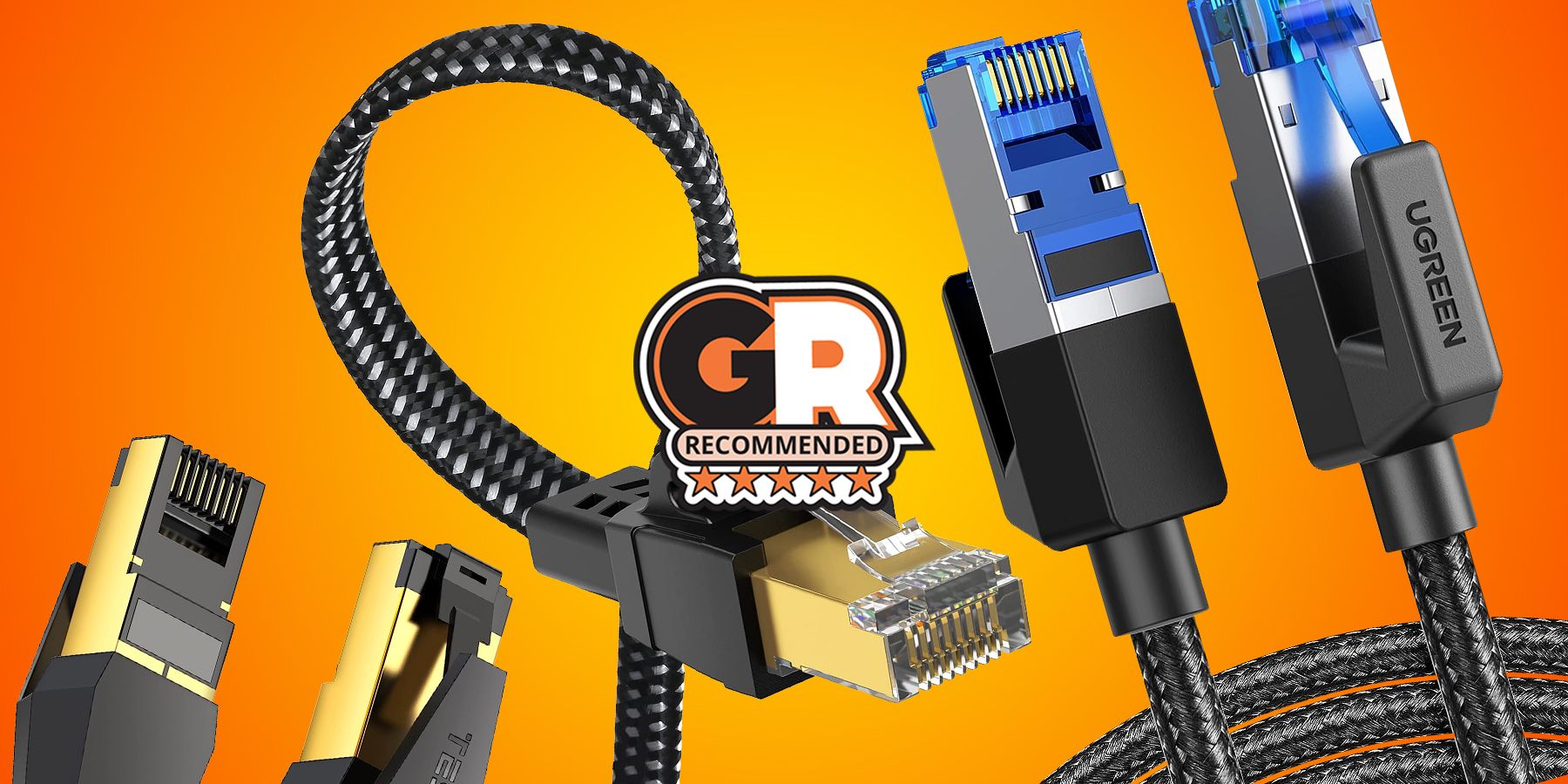
Best Ethernet Cables for Gaming
This guide is dedicated to helping gamers find the best Ethernet cable for gaming, ensuring a purchase that is both satisfying and future-proof.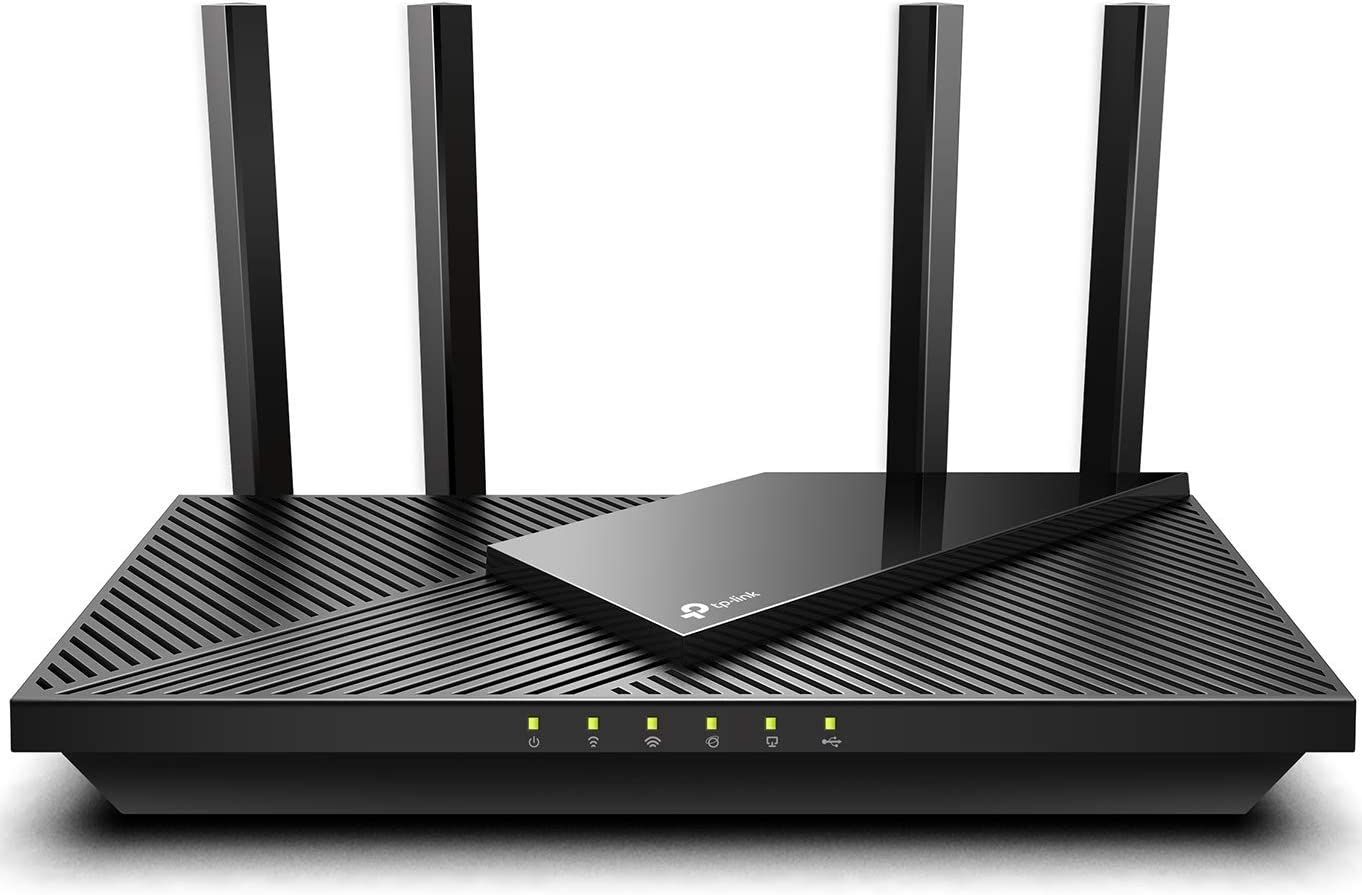
TP-Link AX1800 WiFi 6 Router
No Frills Wi-Fi 6
- Brand
- TP-Link
- Ethernet Ports
- 1× Gigabit WAN Port, 4× Gigabit LAN Ports
- USB Ports
- 1× USB 2.0 Port
- MU-MIMO
- No (Unspecified)
- Mesh Network Compatible
- Yes
- Speeds
- Up to 1201 Mbps single band, up to 1,775Mbps total
- Security
- WPA3 Personal
- Chipset/memory
- 1.5GHz quad-core CPU
- Network
- Wifi 802.11ax 6 (Wifi 6)
- Cheap and gets the job done for 99% of all gamers and demanding users
- Has an excellent phone app to help with setup.
- Supports VPN functionality
- Includes a nifty night mode in play to prevent distractions in the evening
- Could do with a better UI when compared with the competition
- WAN port at 1Gbps effectively limits internet speeds to a maximum of 1Gbps sustained
The TP-Link AX1800 Wi-Fi 6 Router is a decent router that can double as the next router that gives users reliable internet even at a distance while not costing a proverbial arm and a leg. With VPN support, the router can be configured for gaming networks such as WTFast/ExitLag though that might be a bit more complex for entry-level users.
The AX1800 is hardly expected to win any performance awards in a list dominated by gaming routers that are multiples of its price range. It doesn't need to, however; it is an excellent, viable alternative for those looking to step up their gaming needs on Wi-Fi or Ethernet but do not want to break the bank doing so. The AX1800, also marketed as AX21 in some territories, more than delivers on its promise to deliver stellar, reliable performance that should meet the needs of most gamers in 2024 without a hitch.
It does currently trade at a sub-25% discount over MSRP, making it a relatively better bargain than many of its more powerful or flashier alternatives in the market, and earns it a recommendation from the Game Rant team for its versatile budget-friendly offering in 2024.
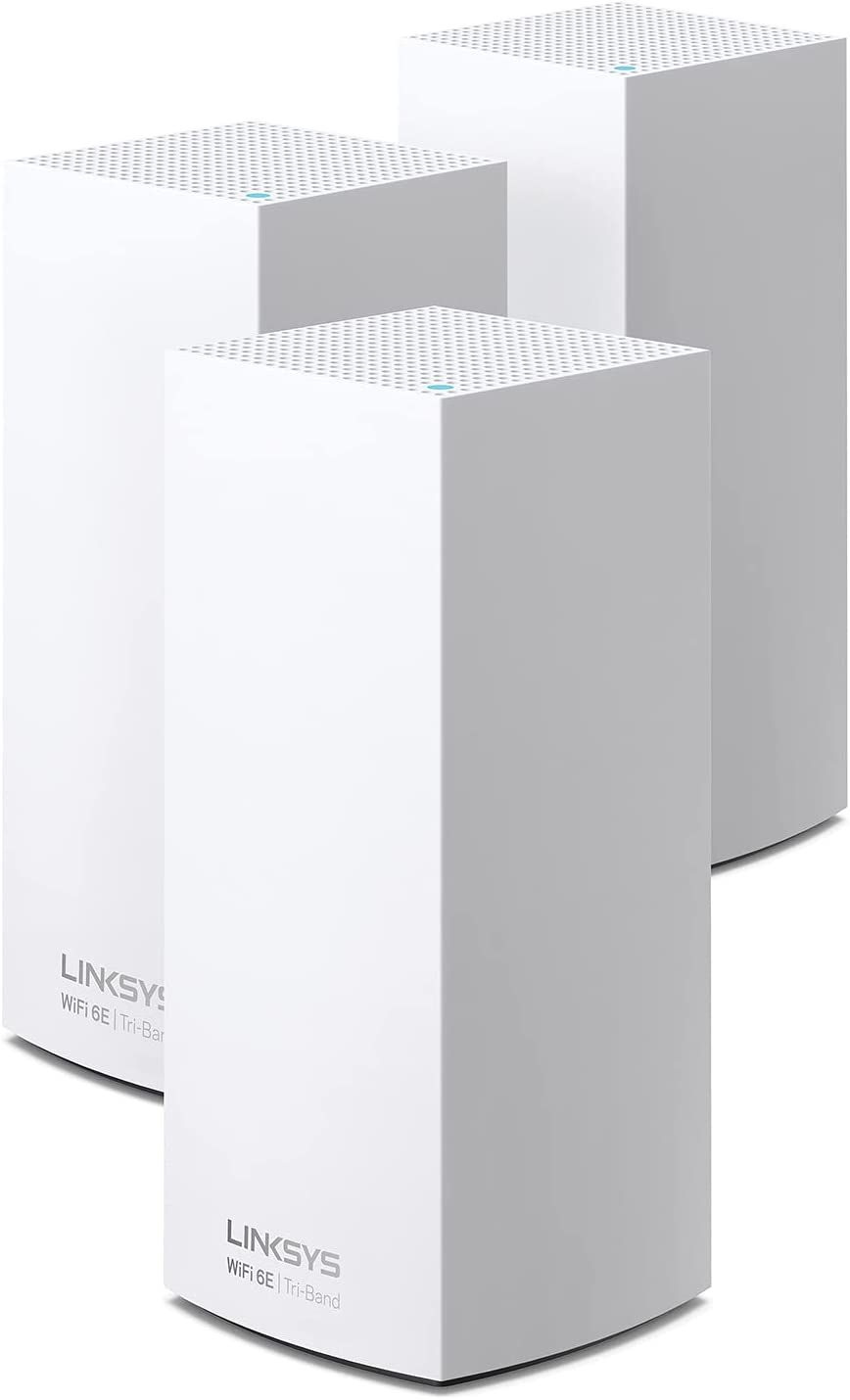
Linksys MX8503 Atlas Max 6E Tri-Band Mesh Wi-Fi 6E System (3 Pack)
Mesh Supremacy
- Brand
- Linksys
- Range
- 9000 Sqft
- Ethernet Ports
- 4x Gigabit LAN, 1x 5 Gigabit WAN
- USB Ports
- 1x USB 3.0 Port
- MU-MIMO
- Yes, 4X4
- Mesh Network Compatible
- Yes
- Speeds
- Upto 4804 Mbps single band, 8400 Mbps total
- Security
- WPA3 Personal
- Chipset/memory
- 2.2GHz Quad Core Processor 1GB RAM
- Network
- Wi-Fi 802.11AX 6/6E
- Excellent Mesh performance with a rated range coverage of 9000sqft
- A good future-proof choice for those looking for a once-in-a-decade upgrade
- Has a simple app for easier installs and setup and comes with excellent phone support
- Supports a very large amount of devices as a small mesh network setup, ideal for those that have multiple devices being used at any time.
- App UI needs some work; quite buggy as per some user reviews
- Pricey versus the competition which offers much more value for money
The Linksys MX8503 Atlas Max 6E Tri-Band Mesh Wi-Fi 6E System is not a router setup for the faint-hearted. It has more than its fair share of quirks for first-time users but at the core of it is an extremely powerful Wi-Fi 6E router system split across 3 powerful mesh units that come as part of the package. It promises extremely low latency and ultra-fast internet across shorter distances while offering passable coverage across as much as 9000 sqft, ensuring that gaming devices in closer proximity can benefit from Wi-Fi 6E gains while allowing coverage for most houses with ease.
That being said, users seem to have mixed reviews about its viability while multiple reviews point to a prolonged installation period or trouble setting this up for users that are not that tech-savvy. Those users that did manage to get their units to work did however get rewarded by a truly next-gen Wi-Fi experience that should stay relevant long after Wi-Fi 7 turns up (expected 2025).
All in all, one of the best mesh Wi-Fi routers available in the market coupled with excellent Linksys customer support and warranty backing of 3 years by default should be enough for most to consider what is a future-proof mesh router system that can keep up with advances in Wi-Fi 6E. If one would not risk it, however, they can scroll down for the best non-mesh config gaming router offering in the business.
With a large price cut in play since this was last considered by the team at Game Rant, the Linksys MX8503 Atlas offers better value in 2024 while delivering an easy-to-use solution that also has free phone support included as part of the package, making it a great and less prohibitively expensive option versus the competition lately.
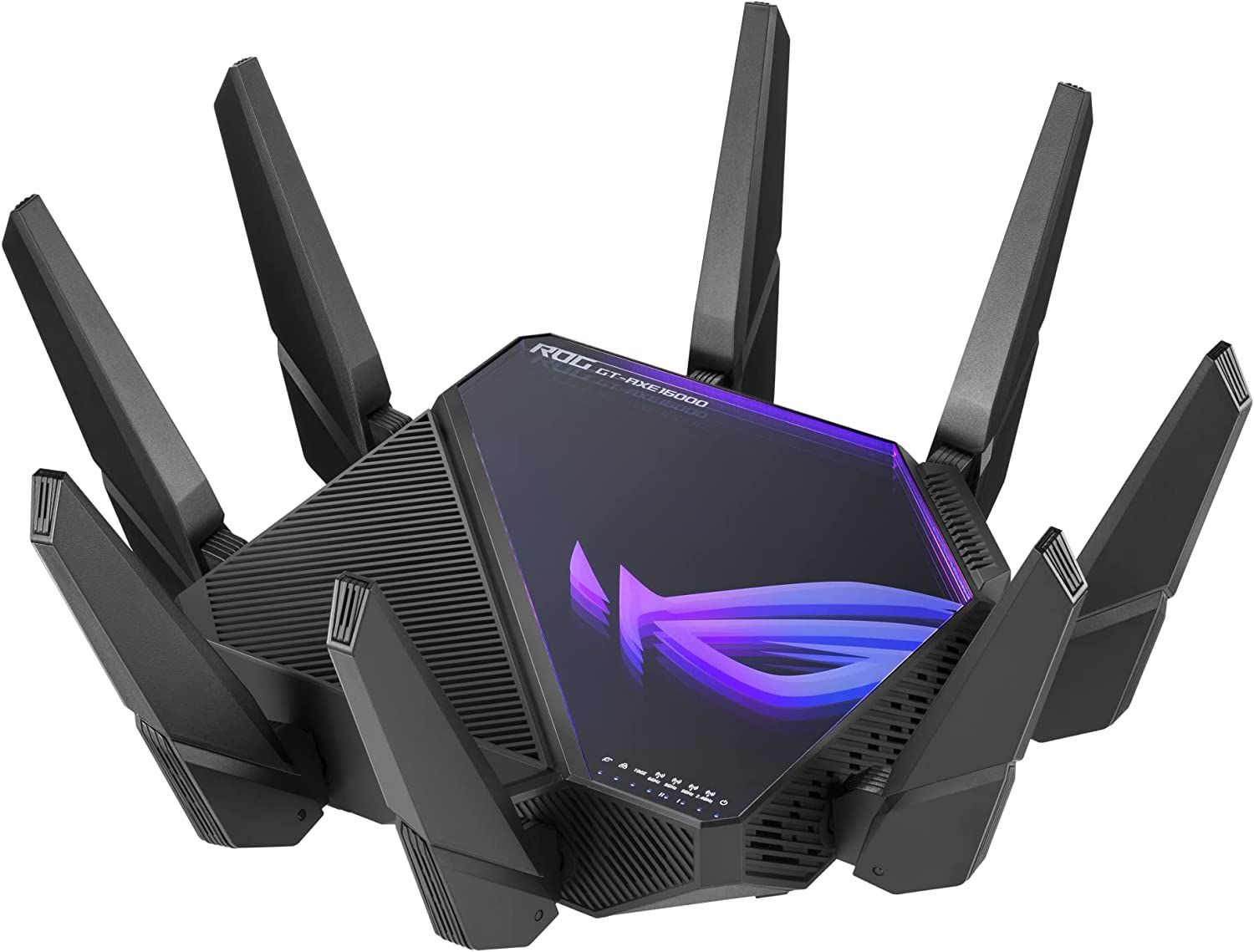
ASUS ROG Rapture GT-AXE16000
Pushing Boundaries and Price Limits
- Brand
- ASUS
- Ethernet Ports
- 1 x 2.5 Gigabit WAN Port, 2 x 10 Gigabit WAN/LAN Ports, 4 x Gigabit LAN Ports
- USB Ports
- 1 x USB 3.2 Gen 1, Port 1 x USB 2.0 Port
- MU-MIMO
- Yes
- Mesh Network Compatible
- Yes
- Speeds
- Up To 4804Mbps Single Band, Upto 16000Mbps Total
- Security
- WPA 3 Personal
- Chipset/memory
- 2.0GHz quad-core processor
- Network
- Wifi 802.11ax 6/6E
- The fastest router on our list bar none in terms of raw throughput
- Has 10Gb ethernet ports out of the box
- Looks arguably far better and premium than any other router
- Has dedicated app support for gaming networks and apps
- Pricey for an excellent, but non-mesh router offering
- Hard to justify this as a purchase over the GT-AXE11000 Router
The ASUS ROG Rapture GT-AXE16000 Gaming Router is a behemoth that some would feel is overkill, an unnecessary beast that ASUS dared to create that can effectively push 16Gbps of raw data through its quad-band Wifi 6E channels. With dedicated support for multiple gaming-related features such as native support from the WTFast network, Game Profile, Game Radar, and Game Boost/acceleration, it does have its fair share of software support for gamers.
It also doubles down as an excellent (albeit with limited use cases) office router for those who have the need for immense bandwidth in a short range, an area where the Wi-Fi 6E AXE-16000 delivers easily.
The ASUS ROG Rapture GT-AXE16000 Gaming Router is the router to beat when it comes to the gold standard for gaming routers. But that should not be necessary for most users who would more than feel miffed about the price; this is one of the priciest gaming-themed routers, even if it packs a massive punch in its spec sheets. Those interested in getting a capable Wi-Fi 6 router that doesn't cost almost $500, should consider its 11000Mbps alternative, also from Asus.
While the ROG Rapture GT-AX11000 alternative does away with Wi-Fi 6E, it is still an excellent router that will hold up for at least most of the current decade with ease as a viable internet gateway. In its defense, the GT-AXE16000 Gaming Router's $100 price cut over its current MSRP at multiple retailers makes it a better choice than most of its competitors.
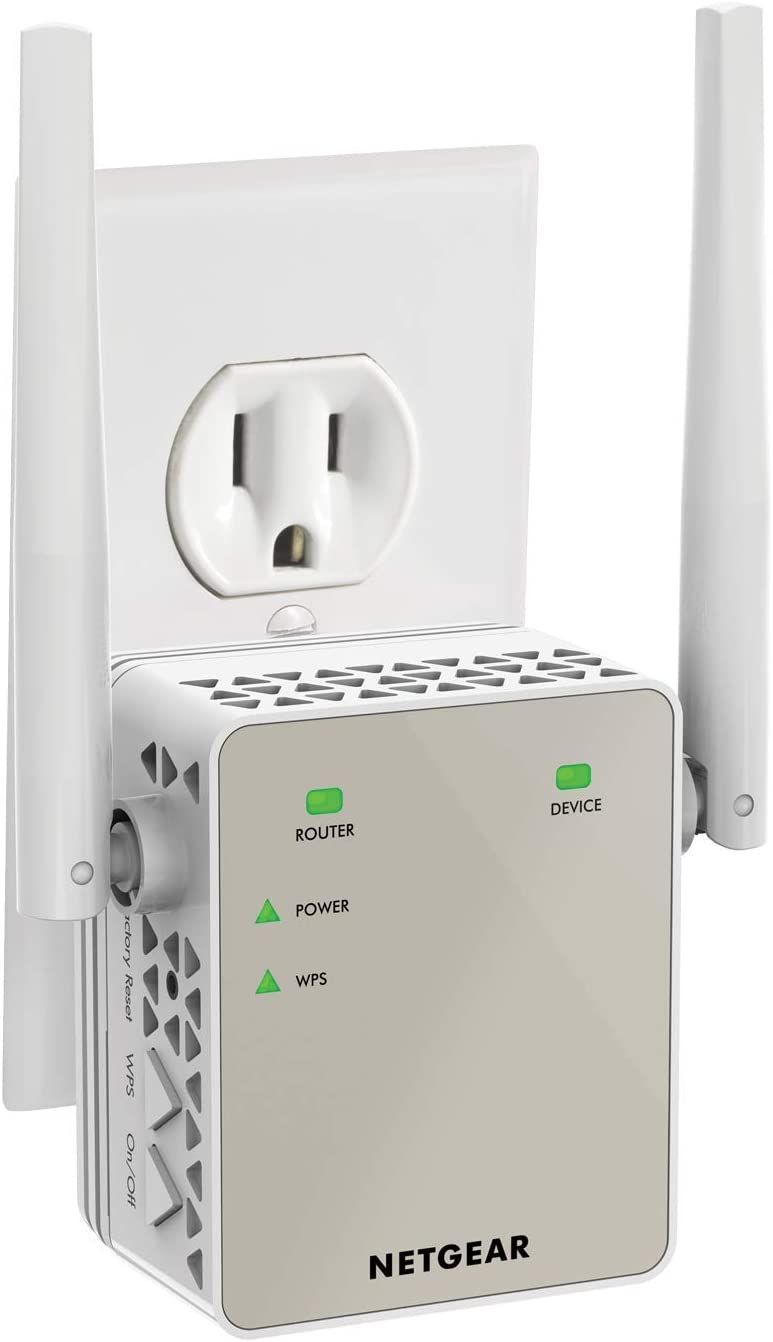
NetGear AC1200 Wi-Fi Range Extender (EX6120)
Excellent Coverage For Less
- Coverage
- 1500 sqft
- Speed
- AC1200 (dual band)
- Number Devices Supported
- 25 simultaneous
- Ports Included?
- 1 x 100mbps ethernet port
- Brand
- NetGear
- Is relatively inexpensive compared to the competition
- Much cheaper than buying a secondary router
- Has excellent coverage and extends the number of devices on a network
- Limited to the max throughput of the primary router
- Offers only a singular ethernet port
The NetGear AC1200 Wi-Fi Range Extender (EX6120) is the answer to wanting better gaming performance or additional coverage without spending a large sum on another router or even a full-fledged gaming router. It is perfect as a device for casual gamers and streamers looking to get signals in a hard-to-reach part of a house or simply needing a 1-button fix for any internet problems related to spotty coverage, slower than anticipated speeds, or simply just a bad entry-level ISP-provided router.
At the same time, the AC1200 is somewhat limited by its capabilities and the distance it is from the router it is range-extending. It doesn't support Wi-Fi 6 or 6E and is limited by its singular 100 Mbps Ethernet port, which essentially means that there are other options out there for those who are willing to pay for them that do a better, albeit much more costly, job that should have players covered for both streaming and gaming use cases.
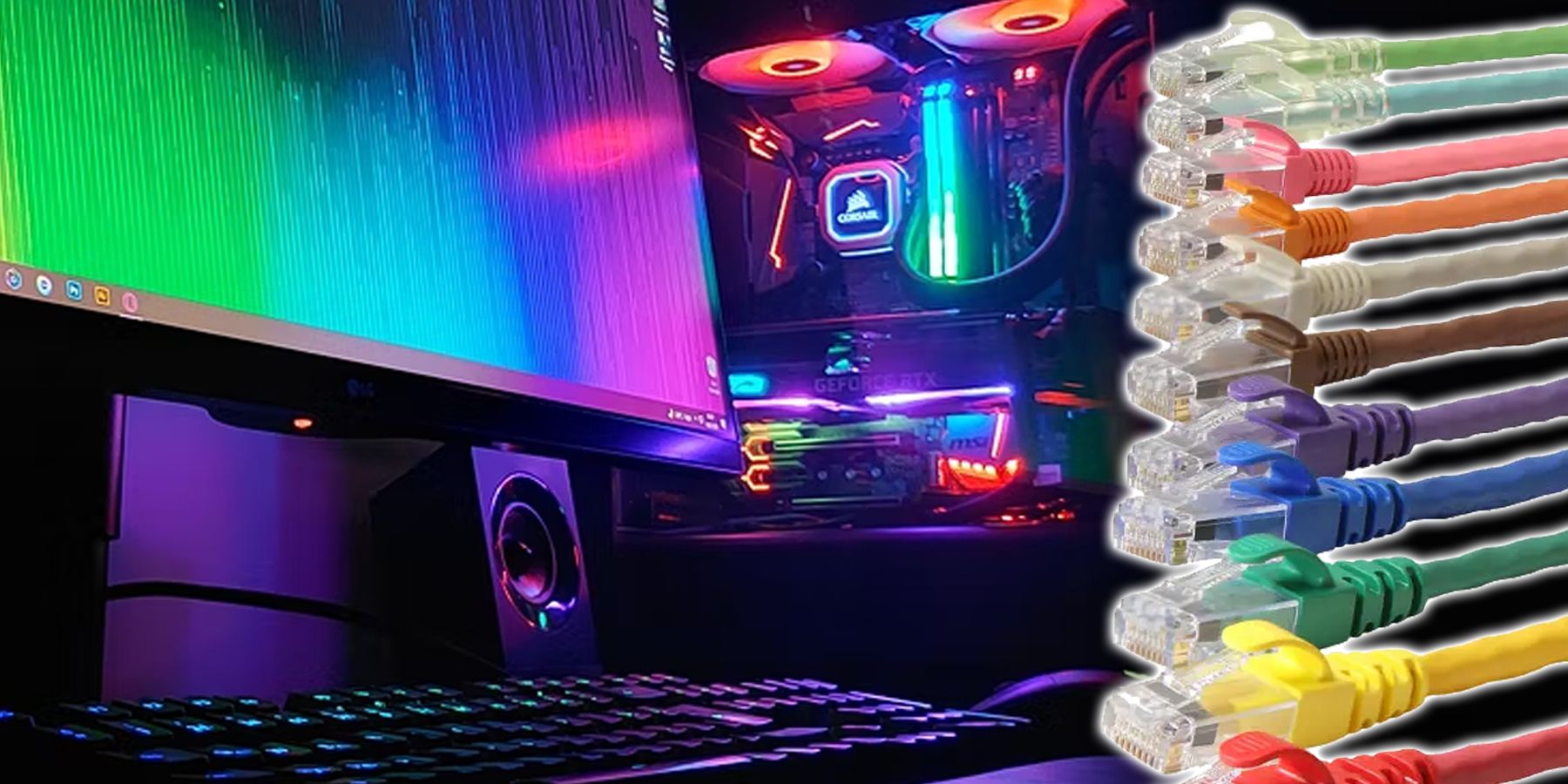
Are Ethernet Cables All The Same For Gaming?
There are a wide array of Ethernet Cables available for gamers, but are they all the same internally?FAQ
Q: Do I need a Wi-Fi 6E Router For Gaming?
No, Wi-Fi 6E is a Wi-Fi standard that tends to be the latest and the greatest for Wi-Fi standards. Because of this, the bulk of devices currently in the market do not support it natively. It is an excellent standard to adopt early, but you might end up paying the mandatory early adopters fee.
Q: Which is better: Wi-Fi or a wired internet connection better for gaming?
Even with recent advances in Wi-Fi tech that brings it very close in terms of latency to wired/Ethernet the latter will always edge it out for the foreseeable future as a medium when it comes to raw latency given the mode of transmission. Ethernet is, and will until superior technology appears, remain superior for gaming needs by far.
Q: How Fast Should A Gaming Router Be?
Speed is a vital feature that distinguishes gaming routers from traditional ones. The gaming routers are powerful and can clock amazing data transmission rates of more than 10000 MB per second, though most fall under the 5000-6000 MB per second range.
